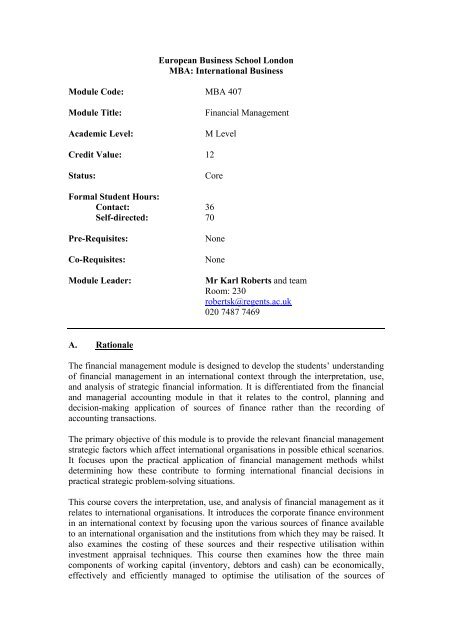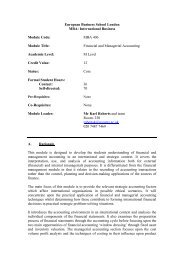MBA 407 Module Title - The European Business School London
MBA 407 Module Title - The European Business School London
MBA 407 Module Title - The European Business School London
You also want an ePaper? Increase the reach of your titles
YUMPU automatically turns print PDFs into web optimized ePapers that Google loves.
<strong>European</strong> <strong>Business</strong> <strong>School</strong> <strong>London</strong><br />
<strong>MBA</strong>: International <strong>Business</strong><br />
<strong>Module</strong> Code: <strong>MBA</strong> <strong>407</strong><br />
<strong>Module</strong> <strong>Title</strong>: Financial Management<br />
Academic Level: M Level<br />
Credit Value: 12<br />
Status: Core<br />
Formal Student Hours:<br />
Contact: 36<br />
Self-directed: 70<br />
Pre-Requisites: None<br />
Co-Requisites: None<br />
<strong>Module</strong> Leader: Mr Karl Roberts and team<br />
Room: 230<br />
robertsk@regents.ac.uk<br />
020 7487 7469<br />
A. Rationale<br />
<strong>The</strong> financial management module is designed to develop the students’ understanding<br />
of financial management in an international context through the interpretation, use,<br />
and analysis of strategic financial information. It is differentiated from the financial<br />
and managerial accounting module in that it relates to the control, planning and<br />
decision-making application of sources of finance rather than the recording of<br />
accounting transactions.<br />
<strong>The</strong> primary objective of this module is to provide the relevant financial management<br />
strategic factors which affect international organisations in possible ethical scenarios.<br />
It focuses upon the practical application of financial management methods whilst<br />
determining how these contribute to forming international financial decisions in<br />
practical strategic problem-solving situations.<br />
This course covers the interpretation, use, and analysis of financial management as it<br />
relates to international organisations. It introduces the corporate finance environment<br />
in an international context by focusing upon the various sources of finance available<br />
to an international organisation and the institutions from which they may be raised. It<br />
also examines the costing of these sources and their respective utilisation within<br />
investment appraisal techniques. This course then examines how the three main<br />
components of working capital (inventory, debtors and cash) can be economically,<br />
effectively and efficiently managed to optimise the utilisation of the sources of
finance once the investment project has been selected. Finally, the course focuses<br />
upon how the distribution policy impacts facing organisation and the merger and<br />
acquisition factors that affect organisational decision making.<br />
B. Aims<br />
To discuss the ideas, frameworks, discussions and issues surrounding Financial<br />
Management in both a domestic, <strong>European</strong> and international, strategic context.<br />
<strong>The</strong> main aims of this module are to appreciate:<br />
• the international financial management environment, recent financial management<br />
issues and their impact upon international organisations from a strategic and<br />
ethical perspective;<br />
• the significance of contemporary international financial management research to<br />
global organisations;<br />
• the optimum international financial management practice both at the<br />
developmental, operational and strategic stages;<br />
• the wider developmental, strategic and ethical international issues concerned with<br />
financial management.<br />
<strong>The</strong> main foundation of this module is the critical understanding and appraisal of<br />
current research in the field of strategic, international and ethical practices within<br />
financial management.<br />
C. Learning Outcomes<br />
Upon completion of the module, students should have knowledge and skills that<br />
connect to the overall learning outcomes of the programme, as indicated in the table<br />
below:<br />
<strong>Module</strong> Learning Outcomes (MLOs)<br />
Attain the knowledge and understanding of the management of<br />
the sources, control and application of finance and its recording<br />
through the accounting and economic process<br />
Appreciate the principles, methods and uses of financial<br />
management in an international context;<br />
Reflect upon the use of systematic and resourceful skills in<br />
evaluating financial management information and creating<br />
alternative possibilities;<br />
Prepare for an international assignment based on accurate selfknowledge<br />
and anticipation of areas of difficulty.<br />
Demonstrate a high degree of self-awareness and sensitivity to<br />
others in an international context.<br />
Identify the significance of independent learning and continuous<br />
education in financial management.<br />
Programme<br />
Learning Outcomes<br />
(PLOs)<br />
A3<br />
B4<br />
C4<br />
B1<br />
B2<br />
B1<br />
B2<br />
B3<br />
A4<br />
B4<br />
C4
D. Teaching/Learning Strategy<br />
<strong>The</strong> teaching/learning strategy for this module has been designed to ensure that the<br />
programme level learning outcomes outlined above have been acquired. <strong>The</strong> teaching<br />
activities will consist of two hours of lectures as well as seminars. This module unit<br />
will be taught in a twelve week semester divided into lectures, seminars and studentled<br />
seminars.<br />
<strong>The</strong> main strategy in lecturing will be to introduce the knowledge base and<br />
demonstrating the evaluation methods. Students are encouraged to be active learners<br />
by developing their critical thinking for the subject. Teaching will be supported by<br />
directed study of textbooks and journal articles. Students will be encouraged to bring<br />
into seminars other articles, case studies. It is designed to make the student active in<br />
the learning process and will allow students to engage with, evaluate and reflect upon<br />
the ideas presented.<br />
<strong>The</strong> lectures are also intended to provide the student with the framework to guide<br />
them in their independent study and to reinforce what they have already learned. <strong>The</strong><br />
lectures will provide a coherent overview of the materials, while the tutorials will<br />
focus upon a series of seminars and case-related material. <strong>The</strong>se will assist the<br />
students in their appreciation of the general principles and issues and to enhance their<br />
understanding of financial management.<br />
Intellectual skills such as critical analysis, synthesis and problem solving will be<br />
practised through the active learning processes within group learning activities such<br />
as seminars, workshops or a field-based study. Independent thought and<br />
understanding of intellectual skills will be examined by unforeseen examinations or<br />
case study exercises.<br />
E. Assessment Methods<br />
<strong>The</strong> assessment consists of two main components (each weighted as being 50%) –<br />
course assessment and examination.<br />
1. Group Presentation 25%<br />
Each seminar group will be divided into reasonable sub-groups which will then be<br />
assigned a topic to present. This will also incorporate self-reflection (on individual<br />
and group based) participation and contribution through a full written report. You<br />
may also be required to make a formal presentation of the Case Report to your peers<br />
and staff members.<br />
Rationale for Assessment:<br />
Students should demonstrate that they can relate problematic, conceptual, theoretical<br />
and practical issues to actual international financial management issues.<br />
Each sub-group’s work will be assessed in terms of the content and clarity of the<br />
presentation.<br />
Programme Learning Outcomes assesses: A3, B1, B2, B3, C1<br />
2. Assignments 25%
Problem solving cases (with a group work element) in high level analysis and<br />
appraisal in practical and multi-dimensional international financial management<br />
situations.<br />
Rationale for Assessment:<br />
Students should demonstrate that they can relate conceptual and theoretical issues to<br />
everyday international financial management issues.<br />
Programme Learning Outcomes assesses: A3, B1, B2, B3, C1, C4<br />
3. Final Examination 50%<br />
An unseen three-hour final examination will require a comprehensive understanding<br />
of the techniques and principles of financial management.<br />
Students must demonstrate an ability to apply judgement and express opinions in<br />
relation to solving practical financial management problems.<br />
<strong>The</strong> students will be examined under a time constraint to create a realistic pressure<br />
environment.<br />
Rationale for Assessment:<br />
Students should demonstrate that they understand financial issues as they relate to<br />
international organisations under the constraints of a deadline.<br />
Programme Learning Outcomes assesses: A3, B1, B2, B3, C1, C2, C6<br />
Knowledge and Skills to be assessed<br />
“If a time-constrained learning outcome has been listed above, you should be aware<br />
that failure to meet that outcome will result in a mark of zero being awarded for the<br />
module work. However, if there are genuine reasons as to why that outcome could not<br />
be met, you should consult and follow the procedure outlined in the section called<br />
“Extenuating Circumstances” in the Student Handbook”<br />
F. Indicative Content<br />
• Topic 1: Course Introduction<br />
• Topic 2: International Sources of Finance, Pike and Neale chapters 1, 16, 18<br />
• Topic 3: International Capital Markets, Pike and Neale chapter 2<br />
• Topic 4: Cost of Capital, Pike and Neale chapters 20, 21<br />
• Topic 5: Investment Appraisal, Pike and Neale chapters 3, 5, 6, 9<br />
• Topic 6: Management of Working Capital: Inventory, Pike and Neale chapter<br />
15<br />
• Topic 7: Management of Working Capital: Debtors, Pike and Neale chapter 15<br />
• Topic 8: Management of Working Capital: Cash, Pike and Neale chapter 15<br />
• Topic 9: Dividend Policy, Pike and Neale chapter 19<br />
• Topic 10: Mergers and Acquisitions, Pike and Neale chapter 22<br />
• Topic 11: Portfolio Diversification, Pike and Neale chapter 10<br />
• Topic 12: Course Review<br />
G. Reading
Core Text<br />
Pike and Neale, 4 th Edition, Corporate Finance and Investment, Prentice Hall, 2003<br />
Recommended Reading<br />
Block & Hirt, 10 th Edition, Foundations of Financial Management, Irwin Publishing,<br />
2002<br />
Brearly and Myers, 7 th Edition, Principles of Corporate Finance, McGraw Hill, 2002<br />
Brigham, 9 th Edition, Fundamentals of Financial Management, Dryden, 2003<br />
Buckley, 5 th Edition, Multinational Finance, Prentice Hall, 2003<br />
Clark, 2 nd Edition, International Finance, Thompson, 2002<br />
Eiteman, Stonehill and Moffett, 10 th Edition, Multinational <strong>Business</strong> Finance,<br />
Addison Wesley, 2003<br />
Emery and Finnerty, 2 nd Edition, Corporate Financial Management, Prentice Hall,<br />
2003<br />
Moyer, McGuigan and Kretlow, 9 th Edition, Contemporary Financial Management,<br />
Thomson South-Western, 2003<br />
Peterson, Fabozzi and Habegger, 1 st Edition, Financial Management and Analysis, J.<br />
Wiley, 2004<br />
Ross, Westerfield and Jordan, 5 th Edition, Fundamentals of Corporate Finance,<br />
McGraw Hill, 2001<br />
Shapiro, 7 th Edition, Multinational Financial Management, J. Wiley, 2003<br />
Van Horse and Wachowitz, 11 th Edition, Foundations of Financial Management,<br />
Prentice Hall, 2002<br />
Watson and Head, 1 st Edition, Corporate Finance, Financial Times, 2001<br />
Journals<br />
Accounting and Finance<br />
<strong>European</strong> Financial Management<br />
International Review of Finance<br />
Journal of Applied Corporate Finance<br />
Journal of Corporate Finance<br />
Journal of Economics and Finance<br />
Journal of Emerging Market Finance<br />
Journal of Finance<br />
Journal of Financial Markets
Journal of Financial Research<br />
Journal of International Financial Management<br />
Journal of International Financial Markets, Institutions & Money<br />
Journal of International Money and Finance<br />
Journal of Investment Management<br />
Journal of Money, Credit and Banking<br />
Journal of Multinational Financial Management<br />
Multinational Finance Journal<br />
<strong>The</strong> Journal of Financial Economics<br />
<strong>The</strong> Journal of Financial and Quantitative Analysis<br />
<strong>The</strong> Journal of Risk Finance<br />
Useful Websites<br />
Accuinvest http://www.accuinvest.com<br />
Features stock data including quotes, charts, technical and fundamental analysis, stock<br />
news, and online investment training.<br />
Alliance for Investor Education http://www.investoreducation.org<br />
Dedicated to facilitating greater understanding of investments and the financial<br />
markets among current and prospective investors.<br />
Analysis of Asset Allocation http://www.asset-analysis.com<br />
Financial market tutorial covering equity analysis, bond market, futures, options,<br />
financial leverage, and more.<br />
FiscalReference.com http://www.fiscalreference.com<br />
Web reference guide to financial information including links, articles, directory, and a<br />
glossary of terms.<br />
Investments Guide http://www.investments-guide.com<br />
Describes investment markets and strategies, as well as guides to educational and<br />
financial news resources.<br />
Investopedia.com http://www.investopedia.com<br />
Educational guide including tutorials and articles.<br />
TeachMeFinance http://www.TeachMeFinance.com<br />
Explains financial management techniques and methodologies.





